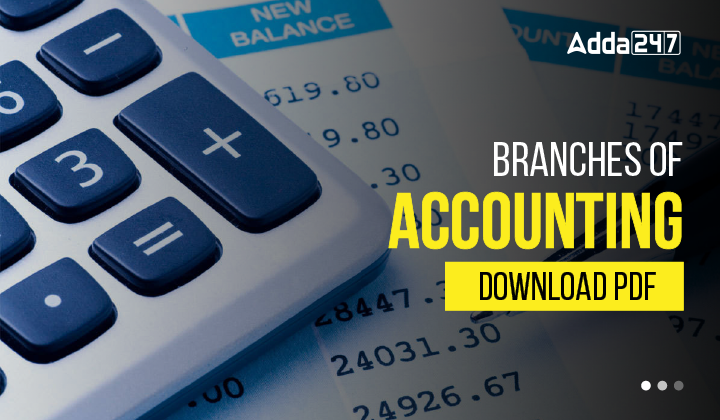Table of Contents
To evaluate the financial position, understand cash flow, analyze business operations, and compare their standing against competitors, businesses frequently employ different types of accounting. Depending on the size of the company, they may choose from several branches of accounting and hire one or more accountants to handle these tasks. Familiarizing oneself with these different accounting branches can aid in better comprehension and determining which types are appropriate for various businesses.
Download UGC NET Commerce Study Notes
What is Accounting?
Accounting is the process of measuring, processing and sharing financial information about businesses and organisations. It is the recording of monetary transactions along with the recording, sorting, retrieving, summarizing, and presenting of the results in various reports and analyses. It is a field of study and profession dedicated to carrying out financial transactions related to business.
What are Accounting Branches?
Accounting branches refer to different means of evaluating, processing and disseminating both financial and non-financial data that affect the financial interests and relationships of a business. To assess the outcome of a company’s economic activities, most organizations use accounting branches. These branches employ diverse methodologies to gather and present information to various stakeholders, such as investors, creditors, management, regulators, or tax collectors.
Due to the growth of global business and the increase in tax regulations and laws, accounting has developed specializations in particular areas of finance. With the advancements in technology and the exchange of international currencies, accounting has expanded its specialities to focus on particular economic interests.
Branches of Accounting
The world of accounting expanded into several branches that specialize in particular legal areas, or focus on a certain aspect of business which are as follows:
-
Financial Accounting
It is a branch of accounting that focuses on the preparation of financial statements for external stakeholders, such as investors, creditors, and regulators. It involves collecting, analyzing, and presenting financial information in a standardized format that conforms to generally accepted accounting principles (GAAP). The main goal of financial accounting is to provide accurate and timely financial information to help stakeholders make informed decisions about a company’s financial performance, position, and prospects. Financial accounting typically includes preparing balance sheets, income statements, and cash flow statements, as well as accompanying notes and disclosures.
-
Cost Accounting
Cost accounting focuses on measuring, analyzing, and reporting the costs associated with producing goods or services. It involves the identification and allocation of costs, such as direct materials, labour, and overhead, to specific products or services. Cost accounting provides managers with detailed information about the cost of producing a product or service, which helps them make informed decisions about pricing, production, and profitability. This information is used to control costs, optimize operations, and improve efficiency. Cost accounting can also be used to identify areas where costs can be reduced or eliminated, which can lead to increased profitability for a company.
-
Management Accounting
Management accounting is a branch of accounting that focuses on providing financial information to internal stakeholders, such as managers, to support decision-making processes. This type of accounting involves the identification, analysis, and reporting of financial and non-financial data that is relevant to a company’s operations and strategy. It can include preparing budgets, analyzing performance, forecasting financial results, and providing insights into business strategy. The information provided by management accounting is typically used to help managers plan, control, and monitor the performance of a company’s operations and projects. It is not usually disclosed to external stakeholders and is intended to support internal decision-making processes.
Financial accounting VS Cost accounting VS Management Accounting
Since, all the branches of accounting are meant for different purposes. Following are the major differences between Financial, Cost and Management Accounting. These are given below
| Category | Financial Accounting | Cost Accounting | Management Accounting |
| Purpose | To provide financial information to external stakeholders | To determine the cost of products and services | To provide financial information to internal stakeholders |
| Focus | Historical transactions and financial statements | Costs of production or service | Future-oriented decision-making |
| Regulatory Framework | Must adhere to Generally Accepted Accounting Principles (GAAP) | No specific regulatory framework | No specific regulatory framework |
| Users | Investors, creditors, lenders, regulatory agencies, tax authorities | Internal management, decision-makers, regulatory agencies | Managers, executives, internal decision-makers, and operational staff |
| Frequency of Reports | Typically quarterly and annually | As per management requirements usually on a continuous basis | As per management requirements usually on continuous basis |
| Nature of Reports | Standardized, formal reports | Customized reports | Customized reports |
| Legal necessity | Financial accounts are prepared under company law, income tax law, etc | Cost accounting is purely voluntary | Management accounting is purely voluntary |
| Accounting System | It is based on double- an entry system | Based on all the facts and information related to the cost involved | It is not based on double- entry system |
| Financial Statements | Income statement, balance sheet, cash flow statement | None, although cost data may be used in financial statements | None, although data may be used in financial statements |
| Types of Analysis | Ratio analysis, trend analysis, comparative analysis, etc. | Cost-volume-profit analysis, variance analysis, etc. | Budgeting, forecasting, performance analysis, etc. |
| Examples of Decisions | Whether to invest in a company, extend credit or buy/sell stock | Whether make or buy products, how pricing of products to be done etc. | Whether to discontinue a product, allocate resources, etc. |
In nutshell, the three branches of accounting – Financial Accounting, Cost Accounting, and Management Accounting – each serve a unique purpose within an organization. Financial accounting focuses on providing financial information to external stakeholders, cost accounting helps businesses determine the cost of production and service, and management accounting provides financial information to internal stakeholders to make informed decisions about the future of the business. While each type of accounting may use different methods and focus on different aspects of the business, they are all important for understanding the financial health of an organization and making informed decisions.
Download Branches of Accounting UGC NET Study Note PDF
| UGC NET Related Articles | |
| UGC NET Notification 2025 | UGC NET Application Form 2025 |
| UGC NET Previous Year Question Paper | UGC NET Syllabus |



 KVS NVS Admit Card 2026 for Teaching and...
KVS NVS Admit Card 2026 for Teaching and...
 HPRCA TGT Admit Card 2026 OUT at hprca.h...
HPRCA TGT Admit Card 2026 OUT at hprca.h...
 UGC NET Answer Key 2026 Out (Memory Base...
UGC NET Answer Key 2026 Out (Memory Base...












